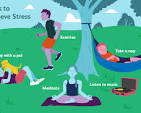Effective Stress Management Activities
Stress is a common experience in today’s fast-paced world, but it’s important to find ways to manage and reduce stress levels to maintain our well-being. Engaging in stress management activities can help alleviate tension, improve mental clarity, and enhance overall quality of life. Here are some effective stress management activities you can incorporate into your daily routine:
Mindfulness Meditation
Mindfulness meditation involves focusing on the present moment without judgment. This practice can help calm the mind, reduce anxiety, and increase self-awareness. Spend a few minutes each day meditating to center yourself and cultivate a sense of inner peace.
Physical Exercise
Regular physical exercise is not only beneficial for your physical health but also for managing stress. Engaging in activities like yoga, running, or dancing can release endorphins, which are natural mood lifters that help reduce stress levels.
Deep Breathing Exercises
Deep breathing exercises are simple yet powerful tools for stress management. Practice diaphragmatic breathing by inhaling deeply through your nose, holding for a few seconds, and exhaling slowly through your mouth. This technique can help relax your body and mind.
Creative Outlets
Engaging in creative activities such as painting, writing, or playing music can be therapeutic and serve as a form of self-expression. These outlets allow you to channel your emotions constructively and provide a sense of relaxation and fulfillment.
Time Management Strategies
Poor time management often leads to increased stress levels. Develop effective time management strategies by prioritizing tasks, setting realistic goals, and delegating responsibilities when necessary. Creating a structured schedule can help reduce feelings of overwhelm.
Social Support
Maintaining strong social connections is essential for managing stress effectively. Seek support from friends, family members, or support groups when feeling overwhelmed. Talking about your feelings with others can provide emotional relief and perspective.
Incorporating these stress management activities into your daily routine can help you cope with life’s challenges more effectively and improve your overall well-being. Remember that everyone responds differently to stress management techniques, so experiment with various activities to find what works best for you.
9 Benefits of Stress Management Activities: From Enhanced Focus to Greater Resilience
- Improved mental clarity and focus
- Enhanced emotional well-being
- Reduced anxiety and tension levels
- Better physical health and immune function
- Increased self-awareness and mindfulness
- Boosted mood and overall happiness
- Improved sleep quality and relaxation
- Enhanced problem-solving skills
- Greater resilience in facing challenges
7 Challenges of Stress Management Activities: Finding What Works for You
- Some stress management activities may require a significant time commitment, which can be challenging for individuals with busy schedules.
- Certain stress management techniques, such as meditation or deep breathing exercises, may not provide immediate relief and require consistent practice to see results.
- Engaging in physical exercise as a stress management activity may be difficult for individuals with physical limitations or health conditions.
- Creative outlets for stress relief, such as painting or writing, may not appeal to everyone and could feel like additional pressure rather than relaxation.
- Implementing time management strategies to reduce stress can feel overwhelming initially, especially if you are accustomed to a more chaotic schedule.
- Relying solely on social support for stress management may put strain on relationships and create dependency on others for emotional well-being.
- Not all stress management activities will work effectively for every individual, requiring experimentation and adaptation to find what works best.
Improved mental clarity and focus
Engaging in stress management activities can lead to improved mental clarity and focus. By incorporating practices such as mindfulness meditation, physical exercise, and deep breathing exercises into your routine, you can clear your mind of distractions and enhance your ability to concentrate on tasks at hand. Reduced stress levels allow for better cognitive function, increased productivity, and sharper decision-making skills. Improved mental clarity not only benefits your work performance but also enhances your overall quality of life by promoting a sense of calm and mental alertness.
Enhanced emotional well-being
Engaging in stress management activities can lead to enhanced emotional well-being by providing individuals with effective tools to cope with daily challenges and regulate their emotions. By incorporating practices such as mindfulness meditation, physical exercise, and creative outlets into their routine, individuals can develop a greater sense of self-awareness, emotional resilience, and inner peace. These activities help reduce feelings of anxiety, depression, and overwhelm, allowing individuals to navigate their emotions more effectively and maintain a positive outlook on life. Prioritizing emotional well-being through stress management activities can contribute to a healthier mindset and overall improved quality of life.
Reduced anxiety and tension levels
Engaging in stress management activities offers the significant benefit of reducing anxiety and tension levels. By incorporating practices such as mindfulness meditation, deep breathing exercises, and physical activity into one’s routine, individuals can effectively alleviate feelings of anxiousness and tension that often accompany high-stress situations. These activities help calm the mind, release built-up tension in the body, and promote a sense of relaxation and inner peace. As anxiety and tension decrease, individuals may experience improved mental clarity, enhanced emotional well-being, and a greater ability to cope with stressors in a healthier manner.
Better physical health and immune function
Engaging in stress management activities not only benefits our mental well-being but also contributes to better physical health and immune function. Chronic stress can weaken the immune system, making us more susceptible to illnesses and infections. By incorporating practices such as regular exercise, mindfulness meditation, and deep breathing exercises into our daily routine, we can reduce stress levels and support a stronger immune response. Prioritizing stress management activities can help boost our overall health and resilience, allowing us to better cope with the demands of daily life and maintain optimal well-being.
Increased self-awareness and mindfulness
Engaging in stress management activities, such as mindfulness meditation and deep breathing exercises, can lead to increased self-awareness and mindfulness. By taking the time to focus on the present moment without judgment, individuals can develop a deeper understanding of their thoughts, emotions, and physical sensations. This heightened self-awareness allows individuals to recognize stress triggers more easily and respond to them in a calm and rational manner. Practicing mindfulness also cultivates a sense of inner peace and clarity, enabling individuals to navigate challenging situations with greater resilience and emotional intelligence. Overall, the pro of increased self-awareness through stress management activities empowers individuals to live more consciously and authentically.
Boosted mood and overall happiness
Engaging in stress management activities can significantly boost mood and contribute to overall happiness. When we effectively manage our stress levels through practices like mindfulness meditation, physical exercise, and creative outlets, we release endorphins that act as natural mood enhancers. These activities help reduce feelings of anxiety and tension, leading to a more positive outlook on life. By incorporating stress management techniques into our daily routine, we can experience increased joy, contentment, and a greater sense of well-being.
Improved sleep quality and relaxation
Engaging in stress management activities can lead to improved sleep quality and relaxation. By incorporating practices such as mindfulness meditation, deep breathing exercises, and physical exercise into your daily routine, you can calm your mind and body, making it easier to unwind and prepare for a restful night’s sleep. Better sleep quality not only helps you feel more refreshed and energized the next day but also enhances your overall well-being by reducing feelings of stress and promoting relaxation. Prioritizing stress management activities that support improved sleep can have a profound impact on your mental and physical health.
Enhanced problem-solving skills
Engaging in stress management activities can lead to enhanced problem-solving skills. When we effectively manage our stress levels, our minds are clearer, and we are better equipped to approach challenges with a calm and focused mindset. By reducing the impact of stress on our cognitive functions, we can think more critically, make sound decisions, and find creative solutions to complex problems. Improved problem-solving skills not only benefit us in handling day-to-day issues but also empower us to navigate larger obstacles with confidence and resilience.
Greater resilience in facing challenges
Engaging in stress management activities can lead to greater resilience when facing challenges. By implementing strategies such as mindfulness meditation, physical exercise, and deep breathing exercises, individuals can build mental and emotional strength to navigate difficult situations with more ease. Developing resilience through these activities allows individuals to bounce back from setbacks, adapt to changes, and maintain a positive outlook even in the face of adversity. This enhanced ability to cope with stressors ultimately empowers individuals to approach challenges with a sense of confidence and determination.
Some stress management activities may require a significant time commitment, which can be challenging for individuals with busy schedules.
Some stress management activities may pose a con in that they demand a substantial time commitment, presenting a challenge for individuals already juggling busy schedules. Engaging in practices like mindfulness meditation, regular exercise, or creative outlets may require dedicated time each day, making it difficult for busy individuals to prioritize these activities amidst their other responsibilities. Balancing the need for stress management with existing time constraints can be a struggle, highlighting the importance of finding efficient and adaptable strategies that fit seamlessly into hectic lifestyles.
Certain stress management techniques, such as meditation or deep breathing exercises, may not provide immediate relief and require consistent practice to see results.
Certain stress management techniques, like meditation or deep breathing exercises, may present a con in that they do not always offer immediate relief. These practices often require consistent and dedicated effort to experience noticeable results. While some individuals may seek quick fixes for stress, it’s important to understand that the benefits of these techniques typically emerge over time with regular practice. Patience and persistence are key when incorporating such stress management activities into your routine, as the long-term benefits of improved mental well-being and resilience often outweigh the initial challenges of delayed gratification.
Engaging in physical exercise as a stress management activity may be difficult for individuals with physical limitations or health conditions.
For individuals with physical limitations or health conditions, engaging in physical exercise as a stress management activity can present challenges. Conditions such as chronic pain, mobility issues, or cardiovascular problems may restrict the ability to participate in certain types of exercise. This limitation can be frustrating for those who rely on physical activity to manage stress. In such cases, it is important for individuals to explore alternative stress management techniques that are gentle on the body and tailored to their specific needs, ensuring that they can still effectively reduce stress and promote overall well-being despite physical limitations.
Creative outlets for stress relief, such as painting or writing, may not appeal to everyone and could feel like additional pressure rather than relaxation.
For some individuals, creative outlets like painting or writing may not serve as effective stress relief activities. Engaging in these activities could potentially create added pressure to perform or produce something of value, leading to feelings of inadequacy or frustration instead of relaxation. Not everyone may find solace in artistic expression, and forcing oneself to participate in such activities can exacerbate stress rather than alleviate it. It’s important to recognize that different people have varying preferences when it comes to stress management, and what works for one person may not necessarily work for another.
Implementing time management strategies to reduce stress can feel overwhelming initially, especially if you are accustomed to a more chaotic schedule.
Implementing time management strategies to reduce stress can feel overwhelming initially, especially if you are accustomed to a more chaotic schedule. Transitioning from a disorganized routine to a structured one requires effort, patience, and consistency. It may be challenging to break old habits and establish new ones, leading to feelings of frustration and resistance. However, it’s important to remember that the initial discomfort is temporary and that the long-term benefits of improved time management skills, such as increased productivity and reduced stress levels, far outweigh the initial challenges. With perseverance and a willingness to adapt, you can gradually integrate effective time management strategies into your daily life and experience the positive impact on your overall well-being.
Relying solely on social support for stress management may put strain on relationships and create dependency on others for emotional well-being.
Dependence on social support as the sole method of managing stress can have its drawbacks. While seeking comfort and guidance from others is important, relying entirely on external sources for emotional well-being may strain relationships and create a sense of dependency. Constantly turning to others to alleviate stress can lead to feelings of burden on loved ones and may hinder personal growth and resilience. It’s crucial to cultivate individual coping mechanisms and self-care practices alongside seeking social support to maintain a healthy balance in managing stress effectively.
Not all stress management activities will work effectively for every individual, requiring experimentation and adaptation to find what works best.
It is important to acknowledge that not all stress management activities will work effectively for every individual. Each person responds differently to various techniques, and what may be beneficial for one individual may not have the same impact on another. This variability necessitates a process of experimentation and adaptation to discover which stress management activities are most effective for each person. It is essential for individuals to explore a range of strategies and approaches in order to find what works best for their unique needs and preferences. Flexibility and an open-minded attitude towards trying different methods are key in the journey towards effective stress management.




